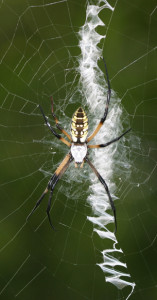I just received a question through our eXtension “Ask an expert” site that I think might be of general interest. It has to do with spiders. The person wrote:
“I have a [lakefront] home… northwest of Fort Worth. The lake facing side of the house has a severe external spider infestation under the high eaves over a sizable deck. The spiders produce massive amounts of webs which must be removed with a pressure washer every few months, which requires 12 to 14 hours of uncomfortable labor. How can these spiders be eliminated or persuaded to create their webs somewhere else? Yes, there are many windows on that side of the house, and I can’t continuously live in the dark after sunset.”
It sounds as if someone has already correctly pointed out the root cause of many spider problems. Food. Lakeside houses are often spider heaven. Lakes produces lots of food for spiders in the form of midges, mosquitoes, and numerous flying insects. Human structures provide semi-protection from the elements and a stable structure on which spider webs can be constructed. Finally, house lights are highly attractive to most nocturnal flying insects. What spider wouldn’t want to live with you?
Unfortunately, I’m not sure there is any completely satisfactory solution to this sort of problem. Insecticides applied to the eaves and soffits of the home might provide some, temporary protection (anyone wanting to try this might look for products containing the active ingredients cyfluthrin or bifenthrin–though not close to water). Eliminating or reducing the on-time for outdoor lights shining on the home would also help. Because nocturnal insects are attracted most strongly to UV light (toward the blue end of the light spectrum), installing changing outside bulbs to yellow bug bulbs (less UV) or low pressure sodium vapor (for security lights) will definitely reduce the spider food (nocturnal insects) being attracted to homes.
But, as the inquirer points out, we cannot eliminate all artificial lighting around homes. I have a thriving community of geckos around the outside of my home. Even though we keep no outdoor flood lights on at night, the geckos still make a comfortable living feeding off the insects drawn to our lighted windows at night.
In the end, this spider problem may be something my correspondent (and many others in a similar situation) simply have to learn to live with. If you will excuse a little philosophizing, this situation points out a general truth about pest control and all human efforts to modify our environment to make it the way we like. We share this planet, for better or worse, with lots of other critters, including insects and spiders. Spiders play an important role in regulating populations of aquatic and terrestrial insect and are actually highly beneficial–if sometimes a nuisance. When we build a home in a beautiful setting, like the piney woods of east Texas, or a peaceful lake, we join the community of life in that area. And like a human community, there will be some neighbors we like, and some we don’t–some we can ignore or deal with, and others we can’t.
And hey, it could be worse. Check out my post on spiders from earlier this summer.
